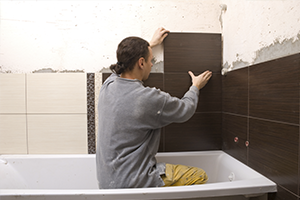Safety During Small Bathroom Renovations
Small bathroom renovations can be fun and financially beneficial for a DIYer, but every home renovation should be tempered with a little caution. Renovation usually means taking out your handy tool box and loosening some screws here and there or dismantling something. And any time you dismantle something, there’s a chance to uncover a problem in the bare bones beneath. But for small bathroom renovations, it could potentially mean altering or damaging the plumbing as well.
Here are some cautions to take with small bathroom renovations:
Paint – Believe it or not, lead paint is a possibility inside the home just as much as outside. In a bathroom especially, baseboards with lead paint might peel and flake from the moisture in the air and over time create a serious health hazard. Remove old paint rather than painting over it to ensure this toxin doesn’t stick around. CAUTION: Lead paint is hazardous to breathe, and many states require a specific contractor for proper removal. However, if you elect to do it yourself, remember to:
- Wear a mask.
- Move all other objects out of the bathroom so they are not contaminated.
- Cover any objects that can’t be moved with polyethylene plastic.
- Cover the door with poly to contain the air contamination.
- Shut off heat, air conditioning, and other ventilation systems.
- Walls/Tile – Before you start breaking down walls to renovate or popping up vinyl tiles, be aware that asbestos could be lurking. Just like with lead paint, particles may be released into the air and cause a serious health hazard, putting you and your loved ones at risk for lung cancer and disease. If you find asbestos, you may be required to notify certain agencies, depending on your state. Either way, you’ll definitely want a professional to guide you through the removal process.
- Plumbing – If part of your renovation requires something even as small as putting in a new toilet, there is the opportunity to crack pipes or uncover old or leaky plumbing. Older houses may even have clay pipes that become infested with roots or other debris and have cracked over time. To avoid flooding, sewer backups, and other costly issues, simply have an inspector check the system while the renovations are taking place.
If carried out correctly and with the right precautions, small bathroom renovations can pay for themselves. How? By increasing the value of your home. Not to mention, they can provide clean and fresh updates to old and inefficient layouts or conditions. In short, they can make your family more comfortable. So don’t be discouraged by the cautions; they are only meant to make sure your work turns out spotless and safe!
During small bathroom renovations, you might come across plumbing that you believe is old or inefficient. Or maybe you find mold and a leak behind some bathroom tiles. Carrying out the renovations on your own doesn’t mean you should deal with potential problems on your own. Before you cover up that mold stain or ignore the voice in the back of your head, Inspect It 1st! A skilled home inspector from Inspect It 1st can give you the peace of mind that your plumbing is solid or give you the knowledge you need to have it repaired. Small bathroom renovations may not be easy, but they can be done safely and help you keep your loved ones safe, too!

 Paint – Believe it or not, lead paint is a possibility inside the home just as much as outside. In a bathroom especially, baseboards with lead paint might peel and flake from the moisture in the air and over time create a serious health hazard. Remove old paint rather than painting over it to ensure this toxin doesn’t stick around. CAUTION: Lead paint is hazardous to breathe, and many states require a specific contractor for proper removal. However, if you elect to do it yourself, remember to:
Paint – Believe it or not, lead paint is a possibility inside the home just as much as outside. In a bathroom especially, baseboards with lead paint might peel and flake from the moisture in the air and over time create a serious health hazard. Remove old paint rather than painting over it to ensure this toxin doesn’t stick around. CAUTION: Lead paint is hazardous to breathe, and many states require a specific contractor for proper removal. However, if you elect to do it yourself, remember to: